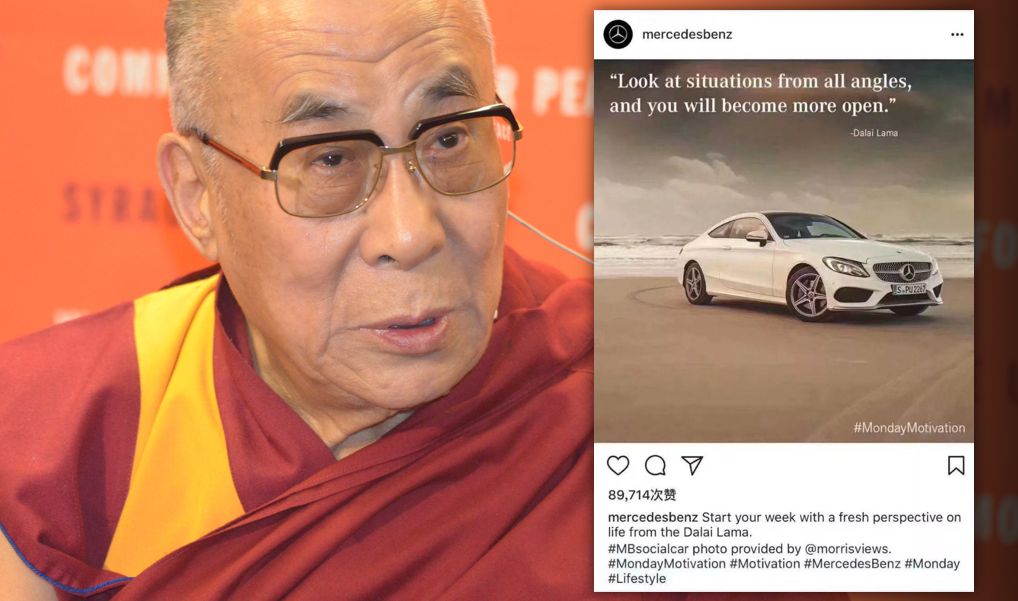The German carmaker Mercedes-Benz issued a timorous apology last week on one of China’s largest social media networks, the latest in a string of international brands running afoul of politics and nationalist sentiment in China.
The incident was ignited by an advertisement posted in English to the Mercedes-Benz account on Instagram, showing a white Mercedes sedan parked on an empty beach and featuring an inspirational quote from the Dalai Lama.
“Look at situations from all angles,” the quote read, “and you will become more open.”
Despite the fact that the Instagram service has been blocked in China since 2014, and that the VPNs required to view it are also now subject to government restrictions, Chinese internet users managed to mobilize indignation over what some perceived as a contemptible legitimization of the exiled Tibetan spiritual leader China routinely attacks as a “separatist.”
The apology, posted to the Mercedes-Benz account on Weibo on February 6, said, “Even though we have done our best to delete this information at the earliest possible moment, we profoundly recognize that this incident hurt the feelings of the [Chinese] people, including those colleagues working at our company in China, and for this we express our deepest apology.”

The next day, a spokesman from China’s foreign ministry weighed in with condescension, saying that “acknowledging one’s errors and correcting them is the most basic principle of proper conduct.”
In a not-so-veiled threat, the spokesman said China in the “new era” would be more confident, and that it “hopes foreign enterprises can show basic compliance.”
Apparently heeding the call, top executives from the German auto giant Daimler, Mercedes-Benz’ parent company, sent an apology letter on Wednesday to the Chinese ambassador in Germany.
But if, heeding the Dalai Lama’s suggestion, we look at this situation from all angles, what are we to make of this torrent of Chinese outrage over a seemingly harmless reference, and of the very compliant response from Mercedes-Benz, which German politician Michael Brand called a prize-winning example of “spinelessness”?
There are a few important points that must be borne in mind. The first, and perhaps most obvious, is that this is one of a growing number of cases in which China’s internal authoritarianism — those restrictions it places on cyberspace and other realms to restrain its own citizens and their ideas — are creeping out into the wider world, potentially impacting us all.
In recent years, China has actively pushed its notion of “cyber-sovereignty,” arguing that all sovereign nations have a right to control the internet as they see fit.
But cases like this one, sparked by a post Chinese users should technically have been unable to view at all, warn that China increasingly has the power to intimidate governments, companies and individuals, driving down the bottom line for global freedom of speech.

Second, it’s important to understand that the language in the Mercedes-Benz apology is much more than the mere acknowledgement of a culturally offensive remark. It is the clear endorsement of a very concrete national political agenda.
In fact, “hurting the feelings of the Chinese people,” the phrase used by the carmaker, has a long history within the Chinese Communist Party. The phrase first appeared in 1959 in the pages of the CCP’s flagship newspaper, the People’s Daily, the offence at that time being a border dispute between China and India.
And it has appeared numerous times since, not as a spontaneous outpouring of Chinese anger but as a way of registering state displeasure.
In 1978, for example, it was Albania that “hurt the feelings of the Chinese people” through its diplomatic split with China, the People’s Daily noting that the country had “viciously attacked Mao Zedong, the great leader of the Chinese people and the CCP.”
More recently, the phrase was uttered in January 2016 by Swedish human rights activist Peter Dahlin in an obviously forced “confession” aired on Chinese national television, filmed during Dahlin’s three-week detention in a “black prison.”

The phrase “hurting the feelings of the Chinese people” is not at all a marker of true Chinese sentiment, much less consumer sentiment.
As one Chinese writer described the essence of these “feelings” in a 2015 article, after it was the Philippines that had offended China: “The feelings of the Chinese people are the strangest things in the world. When you are truly upset, the government cares nothing for your unhappiness. The nerves that govern our feelings, they sprout through the bodies of the Chinese people themselves — but they are pinched between the fingers of those in power.”
Finally, there is the crucial question of how the rest of the world, outside the circled wagons of Chinese cyberspace, should react to the Chinese government’s thousand-cuts approach to our own freedoms.
On this count, we must remember that we too are citizens and consumers, and we should be prepared to hold both governments and companies to account when it comes to upholding our most basic values.
As it moves out into the world with declared “confidence,” China must learn to engage with different views, upholding the principle of respect it has touted in its foreign relations, and it must have a thicker skin about niggling issues like inspirational quotes on Instagram.
And when the Chinese government encroaches on our ideas and beliefs, and our right to express them, the rest of us should perhaps be far more sensitive.
This article first appeared in German at Der Tagesspiegel.
Research for this timeline was conducted by CMP researcher Xiao Han.
